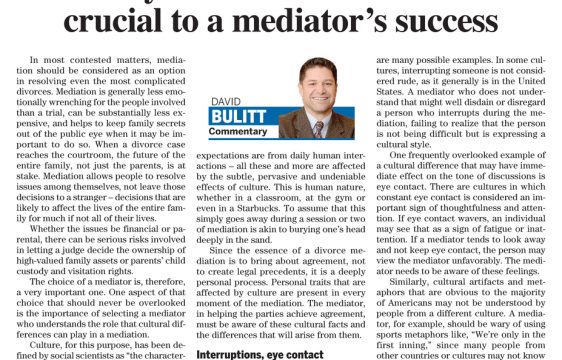Why Cultural Awareness is Crucial to a Mediator’s Success?


With our attorneys’ wealth of industry knowledge, we specialize in providing leading information to our clients.

In most contested matters, mediation should be considered as an option in resolving even the most complicated divorces. Mediation is generally less emotionally wrenching for the people involved than a trial, can be substantially less expensive, and helps to keep family secrets out of the public eye when it may be important to do so. When a divorce case reaches the courtroom, the future of the entire family, not just the parents, is at stake. Mediation allows people to resolve issues amongst themselves, not leave those decisions to a stranger – decisions that are likely to affect the lives of the entire family for much if not all of their lives. Whether the issues be financial or parental, there can be serious risks involved in letting a judge decide the ownership of high-valued family assets or parents’ child custody and visitation rights.
The choice of a mediator is therefore a very important one in any divorce that is going to be mediated. One aspect of that choice that should never be overlooked is the importance of selecting a mediator who understands the role that cultural differences can play in a mediation.
Culture, for this purpose, has been defined by social scientists as “the characteristics and knowledge of a particular group of people, defined by everything from language, religion, cuisine, social habits, music and arts.” It includes “shared patterns of behaviors and interactions that are learned by socialization” as well as “a group identity fostered by social patterns unique to the group.”
The culture in which a person has been brought up will affect her behavior in ways that she will not even be aware of. How someone greets another person, what tone of voice she uses, what her expectations are from daily human interactions – all these and more are affected by the subtle, pervasive and undeniable effects of culture. This is human nature – it is all of us, whether in a classroom, at the gym or even in a Starbucks. To assume that this simply goes away during a session or two of mediation is akin to burying one’s head deeply in the sand.
Since the essence of a divorce mediation is to bring about agreement among human beings, not to create legal precedents, it is a deeply personal process. Personal traits that are affected by culture are present in every moment of the mediation. The mediator, in helping the parties achieve agreement, must be aware of these cultural facts and the differences that will arise from them.
In the highly diverse nation that we live in, there will inevitably be cultural differences between people. They can reflect differences between the parties themselves, or, more subtly, they can express a divergence between the culture of one party to the divorce and the expectations that a mediator may have – again, expectations that spring from the mediator’s own cultural experiences.
A mediator must be attuned to these differences if he wishes to achieve a fair and equitable result for the parties. There are many possible examples. In some cultures, interrupting someone is not considered rude, as it generally is in the United States. A mediator who does not understand that might well disdain or disregard a person who interrupts during the mediation, failing to realize that the person is not being difficult but is expressing a cultural style.
One frequently overlooked example of a cultural difference that may have immediate effect on the tone of discussions is eye contact. There are cultures in which constant eye contact is considered an important sign of thoughtfulness and attention. If eye contact wavers, an individual may see that as a sign of fatigue or inattention. If a mediator tends to look away and not keep eye contact, the person may view the mediator unfavorably. The mediator needs to be aware of these feelings.
Similarly, cultural artifacts and metaphors that are obvious to the majority of Americans may not be understood by people from a different culture. A mediator, for example, should be wary of using sports metaphors like “we’re only in the first inning,” since many people from other countries or cultures may not know the rules of baseball. They may feel that the mediator is using language to exclude them.
One thinker has even suggested that to attempt to mediate a case without fully understanding cultural diversity can verge on the unethical. At the very least, cultural awareness is crucial in bringing about a resolution that is fair to all.
With our attorneys’ wealth of industry knowledge, we specialize in providing leading information to our clients.